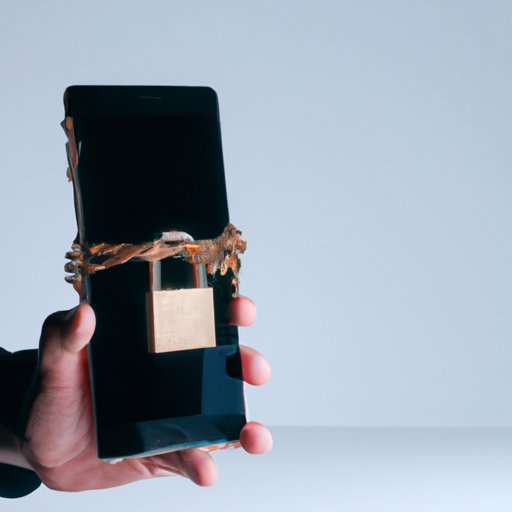
Introduction
Phone tapping is a serious problem that can compromise your privacy, security, and personal information. It refers to the interception of phone calls, messages, and data by a third party without your consent or knowledge. While phone tapping is a common practice in law enforcement and intelligence agencies, it can also be done by cybercriminals, jealous partners, or other individuals with malicious intent. Therefore, it’s crucial to know how to detect if your phone has been tapped and how to protect it from such threats. In this article, we will explore the signs of a tapped phone, testing methods, the technology behind phone tapping, ways to minimize your risks, and the legal implications of phone tapping.
Signs of a Tapped Phone
If you suspect your phone is being tapped, there are a few signs you can look out for:
- Unusual activity: If you notice unusual activities on your phone, such as random restarts, battery drain, or higher data usage than usual, it might be a sign of a tapped phone.
- Background noise: If you hear static, clicking, or other noises during your phone calls, it might be indicative of a phone tap.
- Signal interference: If you experience poor signal quality or dropped calls frequently, it might be due to a tapped phone.
Furthermore, certain scenarios increase the likelihood of phone tapping, such as being a high-profile individual, having sensitive data on your phone, or being involved in a legal or personal dispute.
Testing Your Phone for Taps
There are a few methods you can use to test your phone for wiretaps:
- Scanning Apps: There are several apps available that claim to detect phone taps by scanning your phone for any suspicious activities. While these apps are easy to use, their accuracy is questionable, and they might not be effective against sophisticated tapping methods.
- Resetting Your Phone: Resetting your phone to its factory settings can remove any spyware or hidden software that might be causing the tap. However, this method also erases all your data, so make sure to backup your data before resetting your device.
However, it is essential to note that these methods might not be 100% effective, so it’s best to seek professional assistance if you suspect your phone is being tapped.
Listening in
Phone tapping technology can vary significantly, depending on the type of tapping, the target device, and the purpose of the tap. However, in general, phone tapping works by intercepting and recording calls and messages made on a phone. This can be achieved through hardware devices or software programs that are installed on the target device or the network.
Phone tapping can have significant implications for individuals and society as a whole. It can compromise privacy, expose sensitive information, and violate users’ rights. Moreover, it can also be used as a tool for surveillance, espionage, or blackmail, posing a threat to national security and human rights.
Spotting the Enemy
Various types of individuals or organizations might resort to phone tapping as a means of achieving their objectives:
- Jealous partners: Romantic partners who are suspicious of their significant others’ activities might use phone tapping to monitor their calls and messages.
- Government Agencies: Law enforcement, intelligence agencies, or other government bodies might use phone tapping as part of their surveillance and investigation activities.
- Rivals: Business competitors, political opponents, or other individuals who have a vested interest in obtaining your confidential information might use phone tapping as a means of gaining a competitive advantage.
Therefore, it’s essential to be aware of these risks and take measures to protect yourself from them. Some ways to minimize your exposure to phone tapping risks include being cautious about the information you share on your phone, changing your passwords frequently, and seeking legal recourse if necessary.
Protecting Your Phone from Taps
There are several steps you can take to protect your phone from tapping:
- Securing Your Network: Make sure to secure your wireless network by using strong passwords, encryption, and firewalls.
- Updating Your Software: Keep your phone’s software up-to-date, as new updates often contain security patches and bug fixes.
- Using Privacy Settings: Configure your phone’s privacy settings to limit the access of apps and services to your data.
- Avoiding Suspicious Links: Do not click on links or download files from unknown or suspicious sources, as they might contain malware or spyware.
By following these steps, you can significantly reduce the risk of phone tapping and protect your personal data and privacy.
The Legal Implications of Phone Tapping
The legality of phone tapping varies from country to country, depending on their laws and regulations. Some countries allow law enforcement and intelligence agencies to use phone tapping as part of their investigations, subject to approval from the courts or other regulatory bodies. However, some countries prohibit phone tapping entirely, while others allow it only under specific circumstances, such as national security threats or terrorism-related crimes.
If you suspect your phone has been tapped, it’s important to seek legal advice and report it to the authorities. In some cases, phone tapping might be illegal, and you might be entitled to compensation or other remedies based on your country’s laws and regulations. By reporting it, you can also help prevent future cases of phone tapping and protect the privacy and security of other individuals.
Conclusion
In conclusion, phone tapping is a serious problem that can compromise your privacy, security, and personal information. By being aware of the signs of a tapped phone, testing methods, technology behind phone tapping, and ways to minimize your risks, you can protect yourself from this threat. Moreover, by knowing the legal framework surrounding phone tapping and reporting any suspected cases, you can contribute to a safer and more secure society.
If you suspect your phone has been tapped, don’t hesitate to take action. Seek professional assistance, report it to the authorities if necessary, and take measures to safeguard your privacy and personal information.




